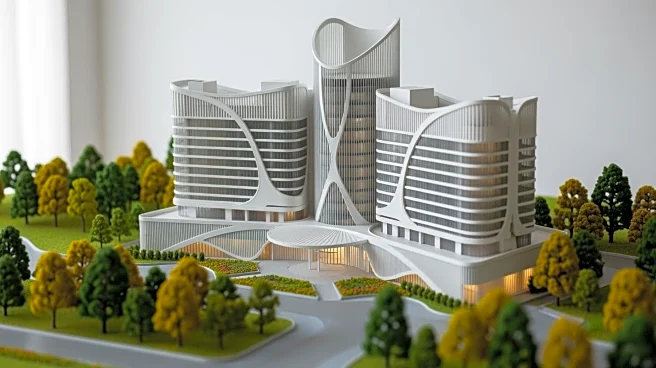What's Happening?
Hyatt Hotels Corporation has announced plans to open Andaz Hiroshima, marking the first Hyatt hotel in Japan's Chūgoku region. The hotel, set to open in 2027, will occupy the 21st to 31st floors of a new
mixed-use high-rise in central Hiroshima. This development is part of a major urban redevelopment project. Andaz Hiroshima will feature 235 guest rooms and suites inspired by the city's cultural legacy, along with amenities such as restaurants, a rooftop bar, a fitness center, and event spaces. The hotel aims to offer personalized experiences by incorporating local culture and traditions into its design and service.
Why It's Important?
The introduction of Andaz Hiroshima is significant for the region's tourism and hospitality industry. Hiroshima, known globally as the City of Peace, attracts international travelers due to its historical sites like the Atomic Bomb Dome and Peace Memorial Park. The new hotel will enhance the city's appeal as a destination by providing high-quality accommodations and unique cultural experiences. This development aligns with Hiroshima's growing reputation as a creative hub, home to designers, artists, and craftspeople. The hotel is expected to boost local tourism, benefiting the economy and promoting cultural exchange.
What's Next?
As the project progresses, stakeholders in the hospitality and tourism sectors will likely monitor its impact on regional tourism. The hotel's opening could lead to increased visitor numbers, prompting further investment in local infrastructure and services. Additionally, the integration of local culture into the hotel's offerings may inspire similar initiatives in other regions, fostering a trend of culturally immersive travel experiences. The success of Andaz Hiroshima could influence future hotel developments in Japan and beyond.
Beyond the Headlines
The development of Andaz Hiroshima highlights the growing trend of incorporating local culture into hospitality services, reflecting a shift towards more personalized and authentic travel experiences. This approach not only enhances guest satisfaction but also supports cultural preservation and appreciation. The hotel's focus on blending modern design with historical elements may set a precedent for future projects, encouraging sustainable and culturally sensitive development in the hospitality industry.










